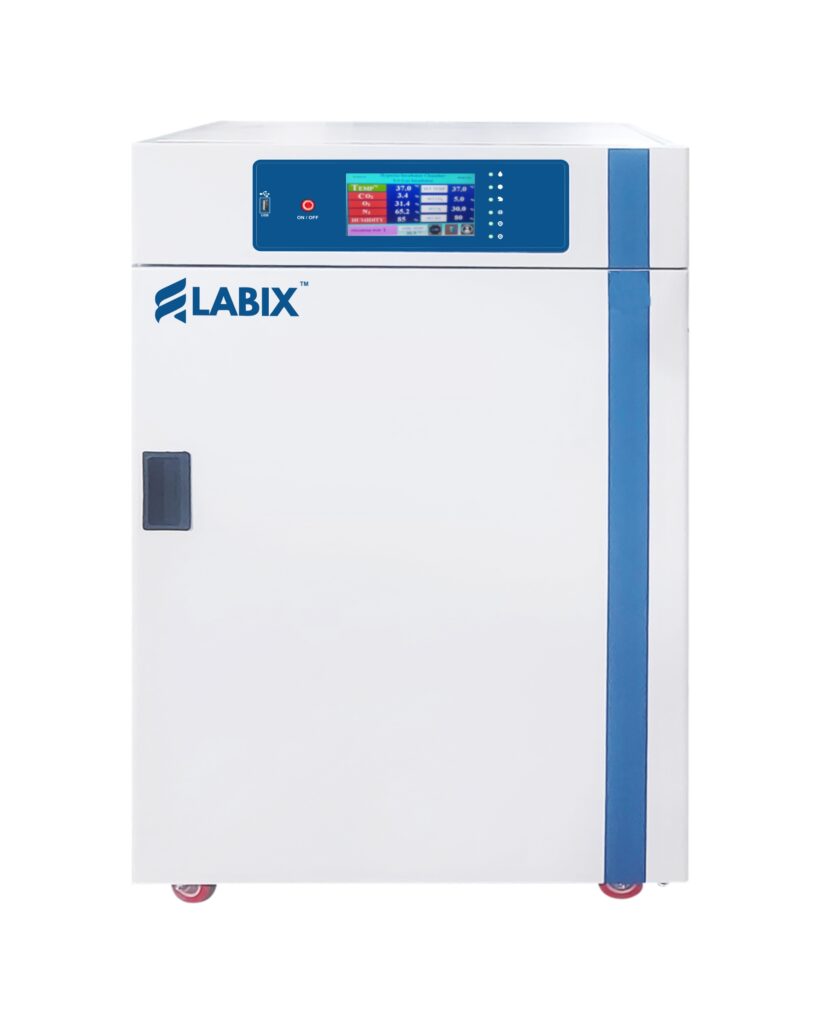What is a CO2 Incubators?
A CO2 incubator is a special laboratory equipment to cultivate cells. It maintains a constant temperature, humidity, and CO₂. This is very crucial to science, medicine and the development of new medicines.

CO2 Incubators can be found everywhere in laboratories. They assist in research in medicine, biotech and miniature organisms. What exactly is a CO₂ incubator? It’s like a mini-body for cells. It maintains the temperature, CO₂ concentration, and moisture at the appropriate degree in order that scientists are able to cultivate the cells and microorganisms in a friendly environment.
Cells are picky! When the heat, pH or water alters excessively, cells cease to grow or even perish. This is the reason we have incubators of CO₂. They provide a body-like environment, and thus the researchers are able to study cells and test drugs without things going off-roof.
Main Components of a CO2 Incubator
A CO₂ incubator is made up of several parts, each serving a function.
- Chamber
- The internal compartment where cell cultures are placed.
- Usually made of stainless steel for easy cleaning.
- Shelves and trays hold culture flasks, dishes, and plates.
- Heating System
- Maintains a constant temperature, usually around 37°C.
- Some incubators use water jackets, others use air-jacket systems.
- Water-jacket systems provide better thermal stability.
- CO₂ Sensor and Control
- Measures CO₂ concentration, often between 5% and 10%.
- Infrared sensors or thermal conductivity sensors are used.
- Maintains pH balance in culture media.
- Humidity Control System
- Keeps humidity levels at 90–95%.
- Prevents evaporation of culture media.
- Uses a water pan or automatic humidity control.
- Air Circulation and Filtration
- Provides even temperature and gas distribution.
- HEPA filters prevent contamination.
- Fans help circulate air within the chamber.
- Control Panel
- Displays temperature, humidity, and CO₂ levels.
- Allows precise adjustments.
- Often includes alarms for parameter deviations.
- Door Design
- Double doors reduce contamination risk.
- Inner glass doors allow observation without disturbing the chamber.
How a CO2 Incubators Works
The working principle is simple but highly controlled.
- The incubator is set to a specific temperature, usually 37°C, which matches the human body.
- A CO₂ supply is connected, and sensors regulate gas concentration.
- Humidity is added through a water reservoir or steam system.
- The atmosphere inside mimics the natural environment of mammalian cells.
- Media pH is maintained by CO₂ dissolving in the culture medium and interacting with bicarbonate.
The result is a stable environment where cells grow in a way similar to inside the body.
Functions of a CO2 Incubators
The functions of a CO₂ incubator are practical and precise.
- Temperature Rule
- Maintains an environment acceptable for cell growth.
- Prevents stress on cultures caused by fluctuations.
- CO₂ Rule
- Maintains pH balance in culture media.
- require for mammalian cell growth.
- Humidity Control
- Reduces evaporation of culture medium.
- Maintains cell health over long-term growth.
- Sterile Environment
- Protects cultures from contamination.
- Uses filtration and sterilization systems.
- Long-Term Storage
- Provides stable conditions for extended culture experiments.
- Research Support
- Essential for drug testing, genetic studies, and cancer research.
Uses of a CO2 Incubators
CO₂ incubators are widely used in many research and clinical fields.
1. Cell Culture
- Growing mammalian cells for study.
- Essential for cancer research, stem cell research, and genetic studies.
2. Tissue Engineering
- Supports growth of artificial tissues.
- Helps in regenerative medicine.
3. Microbiology
- Used for growing bacteria and fungi that require CO₂.
- Important for food welfare and clinical testing.
4. In-Vitro Fertilization (IVF)
- Embryos are cultured in CO₂ incubators.
- Provides stable growth conditions for fertilized eggs.
5. Drug Testing
- Pharmaceutical companies use incubators to test new drugs.
- Allows testing of drug effects on live cells.
6. Vaccine Production
- Used in viral culture for vaccine research.
- Helps produce safe and effective vaccines.
7. Clinical Research
- Hospitals and diagnostic labs use CO₂ incubators for various tests.
Types of CO2 Incubators
There are different types of CO₂ incubators depending on design and use.
- Water-Jacketed CO₂ Incubators
- Use water insulation for stable temperature.
- Take longer to heat but are stable during power loss.
- Air-Jacketed CO₂ Incubators
- Use heated air for fast recovery of temperature.
- Easier to move and maintain.
- Direct Heat Incubators
- Use electric heating elements directly on chamber walls.
- Quick temperature recovery.
- Tri-Gas Incubators
- Control oxygen as well as CO₂ and temperature.
- Useful for hypoxia studies.
Advantages of a CO2 Incubators
Using a CO₂ incubator provides several advantages for research and medical practice.
- Controlled Environment
- Offers stable conditions for sensitive cultures.
- Improved Cell Growth
- Cells grow as they would in natural conditions.
- Flexibility
- Supports many applications from IVF to vaccine production.
- Contamination Protection
- Reduces risk of losing cultures due to microbes.
- Long-Term Experiments
- Maintains conditions for weeks or months without interruption.
- High Accuracy in Results
- Ensures reproducibility of experiments.
Welfare and Maintenance of CO₂ Incubators
Proper maintenance is important for efficiency.
- Regular Cleaning
- Clean chamber walls with disinfectant.
- Remove and sterilize shelves regularly.
- Water Pan Maintenance
- Use distilled water to avoid mineral deposits.
- Replace water frequently.
- Filter Replacement
- Change HEPA filters at recommended intervals.
- Calibration
- Calibrate CO₂ sensors regularly.
- Check temperature and humidity controls.
- Sterilization Cycles
- Many incubators include high-temperature sterilization.
- Run sterilization cycles periodically to reduce contamination.
Example Applications in Research
- Cancer Research
- Scientists grow tumor cells in incubators to test therapies.
- Vaccine Development
- Viruses are cultured in incubators before vaccine formulation.
- Genetic Engineering
- Modified cells are grown in stable environments.
- Toxicology Testing
- Chemical welfare is tested on cultured cells.
- IVF Labs
- Embryos are kept in incubators until transfer.
Future Trends in CO₂ Incubators
Modern incubators are becoming smarter and more automated.
- The incubators are getting smarter and more automated.
- Sensors and Apps Remote monitoring.
- Compliance/Quality Control Data logging.
- High level filtration against contamination.
- Sustainability through energy efficient systems.
How to use CO 2 Incubators in practice
- Cultures should be manipulated with sterile practices at all times.
- Do not open the door often to prevent changes.
- Incubator should be placed in an even-tempered, non-draughty, non-sunny place.
- Record temperature and CO₂ readings on a daily basis.
- Have reserve cylinders of CO₂ so as not to be interrupted.
Educational Value
The knowledge of CO2 incubators is essential to students, as well as young researchers. They can be found in nearly all contemporary biological labs. Learning about their functions will give you an idea of the practical uses of biology and medicine. Incubators demonstrate how science can be made possible using controlled environments, starting with school projects to high-level research.




Add comment